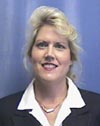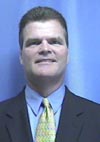Finance, administration reorganizes division
by Cindy AbolePublic Relations
In an effort to refine leadership, improve efficiencies and deliver effective services, MUSC’s Division of Finance and Administration has completed a reorganization among four departments and approximately 800 employees.
It’s part of a goal envisioned by division Vice President John C. Sutusky, Ph.D., who wants to improve operations and develop a quality environment that supports MUSC’s mission. His road to accomplish this focuses on creating a work environment that is honest, communicative, committed, collaborative and accountable among its employees and customers.
Sutusky’s plans for reorganizing the division last spring resulted in the establishment of four senior level positions in the areas of finance, operations, facilities and engineering, and quality.
“Change is critical to better serve the needs of the university community. Our faculty and students cannot realize excellence without excellent support services,” Sutusky said. “We need to establish these positions even as the division's resources have been decreasing in recent years.”
These positions have been part of a long-term plan conceived by Sutusky in 1999. They reflect the division’s needs to focus on substantial changes in business processes and practices.
“Too many of our employees are absolutely consumed with solving day-to-day problems with no time to focus on developing and implementing change which would preclude those problems. This team will enable us to focus attention on systemic change,” Sutusky said.
The area of facilities and engineering added the office of planning and special projects. Engineering chief John Malmrose was hired to head the department. Meanwhile, finance was reorganized to include financial reporting, fiscal affairs, procurement, the budget office, grants and contract accounting under management by Patrick Wamsley, chief financial officer in a newly created role. Operations, which includes business services, Center for Computing and Information Technology (CCIT), human resource management, public safety and risk management, reports to chief of operations Stewart Mixon.
 Beth
Driskell
Beth
Driskell
Another newcomer, Beth Driskell, was named to head the division’s Office of Quality bringing a divisionwide focus towards organizing departmentwide missions and achieving excellence.
“As individuals and as part of a team, each of these people bring a high level of talent, good personal values and integrity to each of these positions,” Sutusky said. “I expect great leadership from each of them in helping to elevate us to a level where we are providing the excellent support services we need to be providing.”
A new financial insight
With more than 15 years experience in higher education and administrative
responsibilities, chief financial officer Patrick J. Wamsley joined the
Division of Finance and Administration’s staff last December after a nationwide
search.
 Patrick
J. Wamsley
Patrick
J. Wamsley
A graduate of Auburn University, Wamsley holds a master's degree in accountancy from Georgia State University and is a certified public accountant. He was formerly vice president of fiscal affairs for eight years at Middle Georgia College, in Cochran, Ga. Wamsley handled all financial and business operations for this small, two-year residential college.
Prior to that, he held several financial positions and posts at Georgia Tech managing payroll, budget, general accounting and systems development for more than a decade.
“It’s difficult to learn everything when you’re at a huge university,” Wamsley said, of his years at Georgia Tech. “I felt fortunate to be able to work also at Middle Georgia where I could learn all aspects of the operations.” During his tenure, he learned and eventually managed various aspects of the college’s financial operations—human resources, police, purchasing, accounting, budgeting, financial aid and development.
Comparing operations at MUSC and Georgia Tech, Wamsley notes the differences lie in focus and specialities. “Although both schools are guided by a research focus, the major difference is the addition of a medical aspect,” Wamsley said.
Wamsley wants to improve processes and practices around campus by simplifying
efforts. In the past nine months, he has identified weaknesses in some
of the most basic methods and procedures. One of his first initiatives
was to meet employees from each of his departments and ask questions relating
to their work processes and efficiencies.
“I wanted to know if they experienced any difficulties or challenges
that were too illogical or unnecessary in their work practices,” he said.
Next, he hired consultants to provide a fit-gap analysis to determine area needs and weaknesses. He's currently working through that data toward his goal to improve processes. Wamsley has joined several committees to look at specific areas from accounting, financial systems to software integration.
It is his plan to evaluate, confirm and simplify processes and systems as needed and make improvements utilizing both technology and training.
“I’m hoping that the combination of our overall efforts involving employees, consultants, committee reports, and discussions with the campus constituency will help provide a roadmap in guiding us to do the best job possible,” Wamsley said.
Focus on customer service
It’s chief operations officer Stewart Mixon’s philosophy that good
customer service begins with an understanding of the needs of the employee/customers
that make up the MUSC community. Mixon strives to explore proactive and
innovative ways to meet customer needs.
 Stewart
Mixon
Stewart
Mixon
With more than 24 years in human resource management, Mixon will help contribute to MUSC’s Human Resources mission through quality customer service and support.
“We’ve got some good people in place who are working hard to make a difference at MUSC,” Mixon said. “It is my goal to align the efforts that are being made with the mission of the university such that we produce a quality product for the employees and departments of MUSC and, as a result, are perceived as a valued resource by our customers.”
“It’s easy to generate a lot of nice things for our customers, but if nobody wants or needs them, then we have wasted our time and resources,” Mixon said. “It boils down to the matter of understanding the environment in which our customers work and developing programs and services that are supportive of our customers needs.”
Mixon joined the division last month in a new position that oversees campus administrative support operations. A Florida native, Mixon comes to MUSC from East Carolina University (ECU) as former associate vice chancellor for the Department of Human Resources, and from the University of Florida in Gainesville where he worked prior to his tenure at ECU.
As president-elect of the College and University Professional Association for Human Resources, Mixon hopes to bring along a national perspective to industry trends and practices. His work allows him to network with more than 6,500 human resource leaders in 1,700 of the country’s colleges and institutions.
“We can learn a great deal by association,” Mixon said. “This opportunity will enable us to interact with specific institutions who have been successful in developing resourceful alternatives to administrative challenges. It’s an open access to innovation on a national scale.”
And Mixon’s not afraid to be creative especially during trying times. In September 1999 following a visit by Hurricane Floyd to East Carolina’s campus, Mixon and his staff developed key support programs to help employees and students in need. They quickly organized an on-campus service/resource center featuring relief organizations from the United Way along with campus counselors and volunteers to assist employees and students in need. As an inspiring example of community assistance, his “adopt-an-employee” program teamed employees affected by flood and storm damage with those who were able and willing to provide financial and emotional support to those campus employees with significant need.
“We learned a great deal about how a catastrophic event can positively influence employees to find creative ways to support those who have significant need,” Mixon said.
As Mixon continues to orient himself to the campus, he will be on the lookout for creative solutions that will enhance administrative services, without violating the policies and procedures that are required in a state university.
Looking at the big picture
When quality coordinator Beth Driskell thinks of quality, she’s looking
at things on a grand scale.
“I see quality in terms of excellence and achievements for the whole organization,” said Driskell. “What are the results? What value are we adding? How are we making a difference? If an organization can effectively deliver processes, they can deliver positive results.”
Driskell’s presence on campus will lead to meeting several goals: Finance and Administration’s John Sutusky’s focus on creating a quality work environment committed to continuous improvements; her career goal for working and training in excellence under the Malcolm Baldridge criteria for excellence; and fulfillment of a lifelong dream to reside in the Charleston Lowcountry.
It is her job to understand every aspect of the division in terms of habits, processes and systems. She looks at processes in terms of how MUSC delivers services to customers.
Driskell’s emphasis on Baldridge’s excellence methodology focuses on seven criteria for organizational effectiveness—leadership, strategic planning, customer and market focus, information and analysis, a human resource focus, evaluating process management and analyzing business results. Her idea of evaluating processes means defining the outcomes that must be accomplished, then measuring and analyzing the process to understand the errors that occur.
The goal is to mistake-proof the process in order to proactively prevent errors, then place controls to sustain the improvements.
“I’m honored and grateful to be part of this effort,” Driskell said. “Dr. Sutusky supports a vision of excellence for our division and university. If you have a leader who is committed to achievement then you’ve accomplished one of the most vital steps to obtaining improvements and organizational effectiveness.”
Originally from Danville, Va., Driskell is a graduate of Averett University and received her MBA from Francis Marion University. She holds several certifications in quality and auditing. Driskell is also six sigma Black Belt certified, a highly regarded measurement standard for business, from Clemson University.
Among her first goals these next six months are to complete several strategic planning sessions and identify priorities within the division that will result in measurable results.
Driskell wants to emphasize that strategic planning is used to assess a clear direction and focus. An organization's vision must be dynamically interrelated with the strategy in order to align resources to accomplish meaningful results. Without a clear focus, resources will be working at cross purposes that are not synchronized to achieve effectiveness for the whole.
Applying this business vision to a university and health care environment is not far fetched. According to Driskell, the horizon shows that today’s health care is looking to adopt six sigma quality into patient care process in addition to its business processes.
“You have to examine the process in order to deliver positive results,”
Driskell said. “Whether it’s health care, business or education, all of
these processes are very similar in terms of needing to be designed to
achieve the desired outcomes.”
Catalyst Online is published weekly, updated as
needed and improved from time to time by the MUSC Office of Public Relations
for the faculty, employees and students of the Medical University of South
Carolina. Catalyst Online editor, Kim Draughn, can be reached at 792-4107
or by email, catalyst@musc.edu. Editorial copy can be submitted to Catalyst
Online and to The Catalyst in print by fax, 792-6723, or by email to petersnd@musc.edu
or catalyst@musc.edu. To place an ad in The Catalyst hardcopy, call Community
Press at 849-1778.